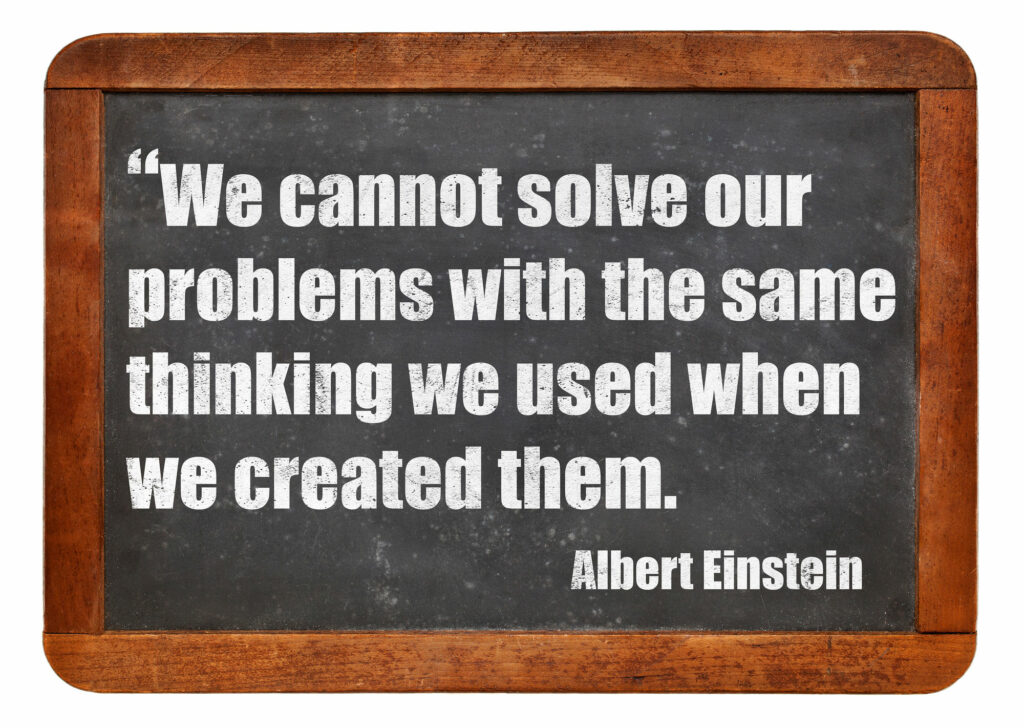In the first three articles of 9-part series, you met David and Amber, who admitted they had no patience, no plan, and no clue for how to end “the insanity” in their home or parent, 15-year-old Johnny, who struggles with ADHD and chronic challenging behavior.
Join us and discover how Collaborative Problem Solving® helped this brave couple resolve the underlying problems that caused Johnny’s challenging behavior—something they have not done until now!
Begin With The End In Mind
Suppose I’m going to help David and Amber achieve their goal of raising Johnny as an independent youngster who thrives (despite having ADHD). In that case, they need a Tour Guide who has a plan.
With Collaborative Problem Solving® or CPS as my approach, the first step to dealing with kiddos with chronic challenging behavior—especially those with ADHD—requires that David and Amber explore their beliefs to understand 1) why it occurs, 2) when it occurs, and 3) how best to manage it.
I began our meeting by asking the three most fundamental questions in parenting. Doing so will supply this brave couple with the clarity and confidence they need to help their family thrive:
- Why is my kiddo so challenging?
- When is my kiddo so challenging?
- How do I build skills to reduce challenging behavior?
Why Is Johnny So Challenging?
As with most couples, David and Amber believed that Johnny was challenging because those actions got him something like attention or helped him avoid things like his math homework.
At one point, Amber shared, “Johnny is a smart kid and knows how to push everyone’s buttons.”
When I asked her to clarify what she meant, she replied, “We believe Johnny is more than capable of making good choices. We really do. The real problem is that he chooses to resist, protest, and not comply with adults at home and in school! He’s so stubborn sometimes!”
David and Amber’s understanding of why Johnny is so challenging was picked up and learned from well-meaning family, friends, and their former therapist, a board-certified behavioral analyst (BCBA).
After probing further, I was not surprised to hear what David recalled learning from those previous meetings:
“Johnny pushes our buttons, disrupts his classroom, and avoids completing his math homework because it helps him get what he wants: attention or escape. If you ask me? I think we need to be more consistent with our consequences. That’s why he’s so difficult.”
The Inherent Problem Of Conventional Wisdom

As David and Amber continued, it was clear that hidden forces—societal beliefs, suggestions from family and friends, and recommendations from their behavioral analysts—had shaped their understanding of why Johnny was so difficult.
Each day, they made thousands of decisions (should they take a jacket? Can I trust my child? Should we discuss this right now, or can it wait?).
Yet, they seldom took the time to pause and think critically about where those decisions took them.
When David and Amber needed to act quickly, they relied on conventional wisdom and took mental shortcuts to enable their snap judgments.
These instantaneous actions reflected their acceptance and adherence to commonly held beliefs, values, and practices.
While these shortcuts proved effective, each distorted their judgments of why Johnny was so challenging.
Left unchecked, David and Amber didn’t recognize alternatives, especially in heated moments.
Even more, they didn’t examine or challenge their beliefs about why Johnny is so challenging.
Parenting On Autopilot
Like most parents, the hustle and bustle of parenting engulfed David and Amber.
Before I became their guide, they were going through the motions and doing the same things they’d always done.
Fueled by conventional wisdom, they were parenting without conscious awareness of where their habits were taking them.
They were accidentally and unintentionally parenting on autopilot.
Amber turned to David as the discussion continued and blurted out, “I’ll speak for myself, but wow… but, after reflecting on this discussion, I think I’ve been running on autopilot for some time now!”
Then, she slowly turned toward David, dropped her head, and whispered, “I’m exhausted. And it’s killing me!”
The Mantra Of Conventional Wisdom
When we use conventional wisdom to understand why Johnny is so challenging, we can summarize it with a simple statement:
Kids do well if they want to
Think about it.
If we follow the established beliefs passed down through generations, conventional wisdom assumes that Johnny will only meet adult expectations—if he wants, desires, or prefers to.
Contingency plans (rewards and consequences) make sense if we believe that all behavior is a choice and kiddos do well if they want to. In that case, we believe that Johnny engages in challenging behavior because he willfully, skillfully, and intentionally chooses to act that way.
Even more, his challenging behavior is purpose-driven: to use it as an instrument so he can out-wit, out-last, and out-play the adults in his life!
This seemingly “harmless” idea or philosophy suggests that challenging kiddos like Johnny, not only choose their behavior, but they also enjoy, relish, and delight in using it.
They take some sadistic pleasure in screaming, shouting, crying, swearing, and hitting others—and they use that strategy to either grab the attention they want or escape from situations they dread.
Thankfully, over 50 years of developmental science reveals a different story. Since we know better, we can do better.
The Destructive Limits of Conventional Wisdom:
Although conventional wisdom has been helpful in many cases, looking through this lens to understand why kiddos are so challenging reveals even more problems for David and Amber.
While David and Amber assumed that kids do well if they want to—and Johnny’s challenging behavior is a choice—our discussion revealed something even more corrosive.
They also believed that Johnny had total and complete access to all the skills he needed to perform well at home or school.
As a result, I asked them to predict what happens when kiddos with ADHD…
- Know what’s expected and….
- Are motivated to meet those expectations…
- BUT… they lack the skills to meet those expectations—skills like flexibility, frustration tolerance, and staying focused.
David and Amber’s response revealed their newfound knowledge:
- Stress activates the survival centers of the brain, and…
- Challenging behaviors follow, and…
- Challenging behavior becomes predictable! (a key theme covered later in this blog series).
Their Understanding of Why Becomes Clearer
As I mentioned in our series, trailblazers like Dr. Jerome Schultz help us recognize that kiddos with learning disabilities (LD) and attention deficit hyperactivity disorder (ADHD) tend to experience high levels of toxic stress at home or school.
So… When parents and teachers assume these kiddos…
- Have all the skills they need to perform well—when in reality, they don’t…
- … they disengage or actively reject adult expectations—to protect themselves from the stress that is central to their experiences.
And what follows is chronic, challenging behavior.
Conventional Wisdom Can Shame Children
As our discussion continued, David and Amber began to recognize their assumptions about why Johnny is challenging, will influence, and continues to influence how they respond to him.
Meanwhile, they recalled an ever-growing list of explanations and labels for why Johnny was so challenging… labels I helped them toss in the trash.
I wonder if any of the following statements sound familiar to you. David and Amber accidentally and unintentionally label Johnny as:
- difficult
- stubborn
- hard-headed
- strong-willed
- inflexible
- manipulative
- selfish
- attention-seeking
- unmotivated
- avoidant
- bratty
- spoiled
- controlling
- resistant
- oppositional
- out of control
- defiant
Sadly, the most shocking explanation for why Johnny is so challenging came from his youth pastor, “Maybe, the devil’s got a hold of him!”
Regardless of your religious affiliation, David and Amber were starting to realize that labeling Johnny as being “skilled” at testing the limits, being persistent at pushing buttons, and pressuring adults to get what he wants ultimately overlooks the underlying causes of challenging behavior (e.g., those predictable behavioral signals that say, “Help, I’m struggling!”)
Does Johnny Choose His Challenging Behavior?

Contrary to popular belief, most of us unknowingly prize the belief that challenging behavior is intentional—a product of poor choices to get what you want: attention or escape.
Our discussion exposed The Conventional Wisdom Formula: Pass a simple idea down through generations, view it as common sense, and act accordingly—despite loads of scientific evidence to expose the flaws and limits embedded into it.
Thankfully, David and Amber’s bravery and persistence helped them recognize the flaws in understanding why Johnny is so challenging.
At the end of our meeting, David blurted out,
“Every time Johnny displays challenging behavior, I not only assume he’s making a poor choice, I feel disrespected! As his dad, I believe it’s my job to force him to make better choices and respect others! So, I mimic what I learned from My parents and teachers. I use rewards and consequences to motivate him and make him WANT to do better.”
Afterward, he turned to Amber, closed his eyes, dropped his head, and placed both hands on his face.
Next, he took a deep breath and sighed, “But it’s not working! And Johnny’s been reacting and protecting himself every step of the way… and we’re exhausted!”
A Shift In Understanding
As David and Amber’s guide, moments like these get me excited because they generate a crucial turning point.
A decisive shift began as David and Amber slowed down, examined, and thought critically about their understanding of why Johnny is so challenging.
As a result, they started to recognize that their quick fixes and snap parenting decisions:
- Create the problems they so desperately want to avoid, and…
- Contribute to “the insanity” in their home!
Thankfully, David and Amber are brave people on a mission to make things better for their family—especially their challenging son!
Conclusion
As our discussion about why Johnny is challenging caused David and Amber to pause, reflect, and think critically about their parenting style, I hope you will do the same.
In my next article, you’ll discover how they used the Collaborative Problem Solving® approach (CPS) to help David and Amber fully understand Johnny’s challenging behavior: why it occurs when it happens, and how best to manage it.
ADHD Counseling in Tustin, CA
If you can relate to David and Amber, you know that managing chronic, challenging behavior shouldn’t be so hard. Discover how to transform life in your living room (or classroom) with ADHD or ADD counseling in Tustin, Ca. I would love to be your guide!







